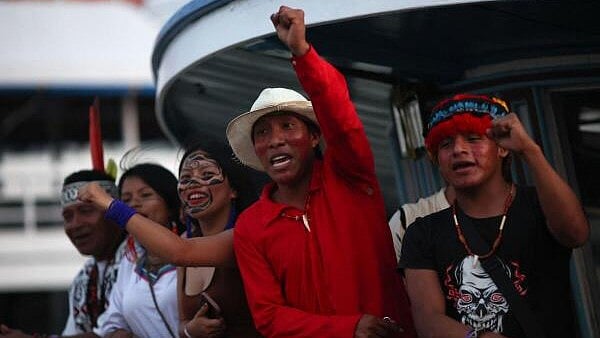
Indigenous flotilla arrives for COP30 climate summit, in Belem. Credit: Reuters
Brazil: After journeying for weeks from a glacier in the Andes to Brazil’s tropical coast, a boat carrying dozens of Indigenous leaders landed in Belem a day ahead of the start of the United Nations' COP30 climate summit.
Their main goal was demanding a greater say in how their territories are managed, as climate change escalates and industries including mining, oil drilling and logging press deeper into the forests.
"We want to achieve more than just guaranteeing money or financing,” said Lucia Ixchiu, an Indigenous K'iche from Guatemala who was among the 60 or so passengers. “We want to reach a consensus where Indigenous territories are no longer sacrificed.”
"It's a dream and a goal, but we know there are many interests at play,” she told Reuters from aboard the boat as it was midway through the Brazilian part of the Amazon.
A report last week by Earth Insight and the Global Alliance of Territorial Communities said that, in the one-third of the Amazon rainforest occupied by Indigenous or local communities, about 17% of those spaces now faced encroachment by oil and gas drilling, mining and logging concessions.
Meanwhile, more than 1,690 environmental defenders were killed or disappeared between 2012 and 2024 in the nations that share the Amazon rainforest, Congo, Indonesia, Mexico and Central America, according to Global Witness.
"Not everything has to revolve around money, Mother Earth isn't a business,” Ixchiu said. "There are other ways of relating with biodiversity and life on the planet that Indigenous populations have been practicing for over 12,000 years."
CELEBRATORY ARRIVAL
When Ixchiu joined the expedition, she was bundled in jackets and woolen chullo against the chill of Andean glacier ice. That look transformed with the warming weather to the airy purple-and-black short-sleeved blouse she wore upon landing to a scene of celebration on the banks of Belem.
The group delivered an offering: candles, chants, sweets, seeds, coca leaves and a llama fetus. It was part of a ceremony to ask for permission while honoring deities and Mother Earth before setting off on the journey.
The flotilla passengers - who had swapped boats along the way - celebrated with a banquet and caipirinhas.
Ixchiu said they chose to start the journey from the headwaters of rivers feeding into the Amazon to highlight the dangers mountain glaciers are suffering from climate change and extraction.
The Andes mountain range is the world's longest and holds over 99% of the world's tropical glaciers. Nearly half of the Amazon River's water comes from the Andes, which have lost between 30% and 50% of their glacier ice since the 1980s, according to the 2025 UN World Water Development Report.
The group stopped along the way in Peru, Colombia and Brazil to highlight challenges facing different Amazonian communities.
In Coca, Ecuador, they held a funeral for fossil fuels. In Manaus, Brazil, they held a screening for short movies and workshops for communities.
They also held a number of political discussions, and delayed the journey periodically due to logistical challenges and the river's changing conditions while observing the debris and pollution.
While the group switched vessels periodically, they arrived in a three-story wooden boat that they nicknamed Yaku Mama, or Water Mother.
Despite tensions in global geopolitics and the slow-moving pace of COP negotiations, Ixchiu said Indigenous youth who she traveled with for the 30-day journey left her feeling optimistic for the future.
"I see the commitment they have for the defense of their territories," she said upon arrival in Belem. "This is the COP of the Amazon because we are here, demanding and taking the places that we deserve."